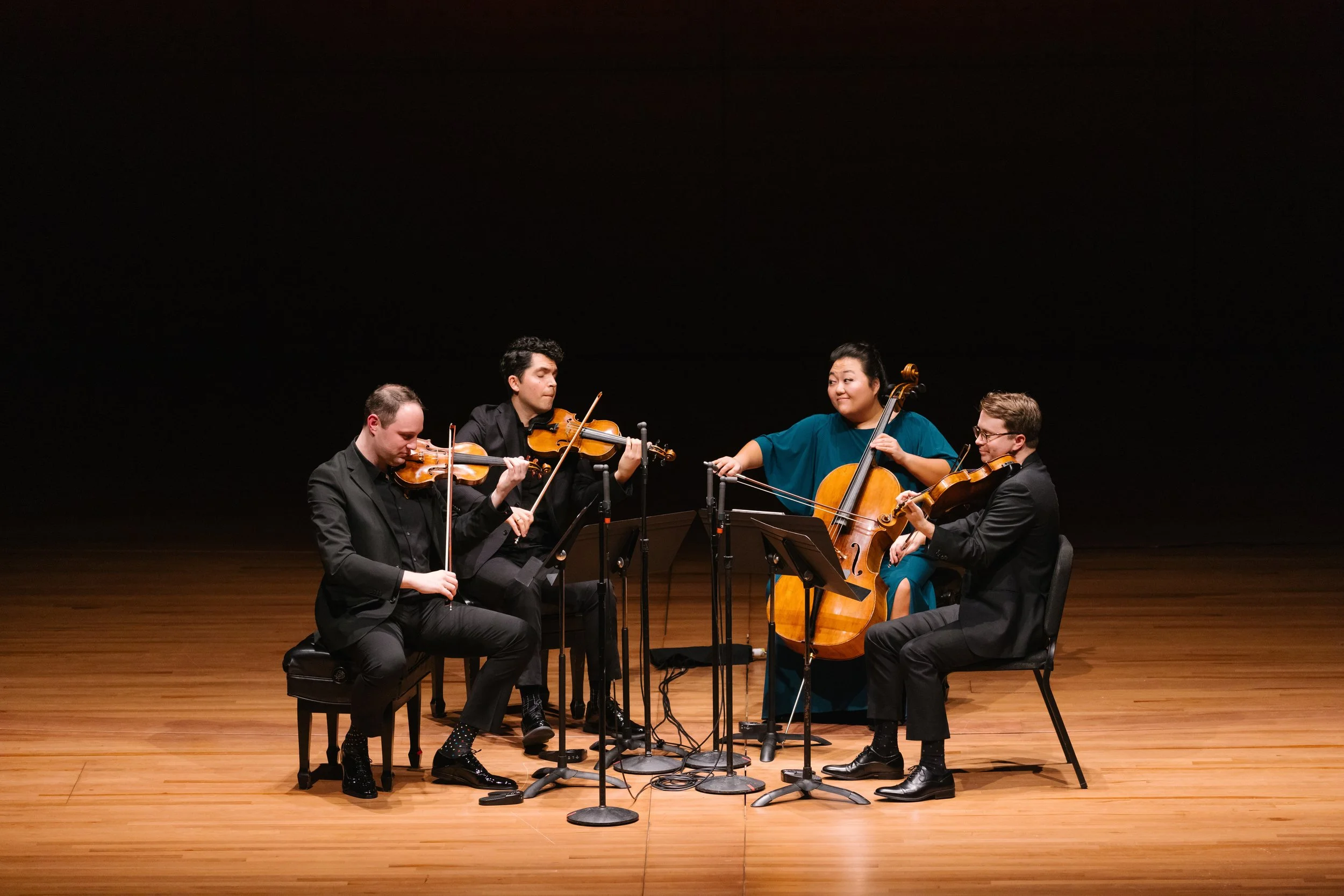REVIEW: Danish String Quartet's Electric and Ecstatic Late Beethoven
Above: The Danish String Quartet in Alice Tully Hall. Photo by Tristan Cook.
February 19, 2020
By Brian Taylor
Beethoven’s late string quartets are not easy listening. But, the Danish String Quartet, concluding their complete cycle of Beethoven’s sixteen quartets in Alice Tully Hall for Chamber Music Society of Lincoln Center, makes them easy to hear.
‘Easy’ is the wrong word, though, as a glance at the composer’s tortured sketches proves. The quartets that a tormented and deaf Beethoven composed in his last years are mercurial and ecstatic. The Danish String Quartet channels the agonized composer’s struggle for redemption, revealing an inner quest for purpose and fulfillment.
The melancholy fugue that opens the monumental Quartet in C-sharp Minor, Op. 131, emerges from the Danish String Quartet with their vibrato perfectly in sync. From dusky sighs of resignation to a wailing cry of desperation, the ensemble shapes the movement with patience and emotional ambition. The six movements unfolding continuously from there reward that patience with moments of intense release, and balance that emotional ambition with sour humor and bristling anger.
Like a veil of depression being briefly lifted, or the courage to get out of bed in the morning, the solemn fugue comes to repose on a unison tonic note (C-sharp) that becomes a leading tone to a gentle, lilting gigue in the new key of D major. Frederik Øland, on first violin, presented the pianissimo Allegro molto vivace theme with the insouciance of a casual whistler on a stroll in the woods. But, violist Asbjørn Nørgaard then takes up the tune, interjecting more intensity as the placid texture becomes windblown. His energy can be a focal point in the ensemble, his tone veering from husky to watery as the music requires..
Photo by Tristan Cook.
A recitative-like dialogue then serves as transition, demonstrating in a nutshell the Quartet’s balance of timing and personality, a subtly executed miniature drama. The movement that follows, Andante ma non troppo e molto cantabile in A major is a substantial journey through sunlit peaks and milky valleys.
Cellist Fredrik Schøyen Sjölin (the quartet’s sole Norwegian) digs in when given the opportunity to interject Beethoven’s contrarian streak, such as the sudden onset of the Presto. This rollicking scherzo finds Beethoven in good humor, but still there’s an inward search. The jolly melody races ahead in fits and starts, as if something were joyously escaping, only to be recaptured, then escape again. The Quartet’s breakneck tempo highlights the movement’s manic quality. When the players — in what was an avant-garde technique in Beethoven’s time — all bow sul ponticello, we hear a ghost, suddenly appearing from another plane of the universe, then quickly rushing back to earth, jolting us back to reality. For a moment, it felt like the air in Alice Tully Hall had been sucked out in a vacuum, taking our breath away. The finale, a diabolical march, struggles toward a sardonic conclusion in C-sharp major — this is no ‘Ode to Joy.’
The Quartet in F Major, Op. 135, that follows — Beethoven’s final composition — is a different animal. Its taut construction recalls the composer’s early classical roots, but its mix of ambiguity and abandon is pure late Beethoven. The second movement scherzo eerily foreshadows musical trends that would emerge a century later, such as jazz syncopation and minimalism.
Here too, the Danish String Quartet (Rune Tonsgaard Sørensen moving to first violin) plays with virtuosic electricity, witty humor, and in the slow movement, Lento assai, cantante e tranquillo, lyrical directness and simplicity. The audience, many of whom had witnessed the quartet’s complete cycle, leapt to their feet in gratitude. Like a pair of great plays that encapsulate the universe of human experience, it was an evening to be savored and contemplated.
Photo by Tristan Cook.








